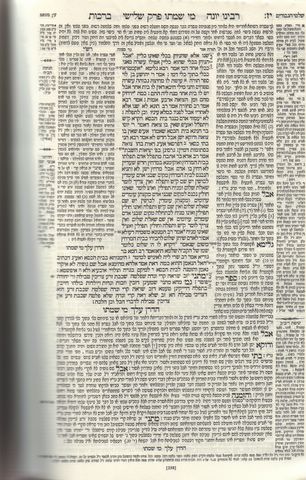
17b
Abaye said: They only said this {that you need a vessel inside of a vessel} as regards a vessel which is not their vessel {set aside for them}. But for a vessel which is their vessel, even ten vessels are like one vessel {and do not suffice}.
Rava said: A covering over a chest is like a vessel inside a vessel.
{Brachot 26a}
Rabbi Yehoshua ben Levi said: For a sefer Torah you make it a partition of 10 handbreadths.
And these words apply only if you have no other house {room} for them, but if you have another room for them, you should place them there.
{The Mishna had said:} "HOW FAR SHOULD HE REMOVE FROM THEM {urine} AND FROM EXCREMENT? FOUR CUBITS."
Rava cited Rav Sechora citing Rav Huna: They only spoke of the case of where it was behind him. But before him, as far as his eyes {can see, in order to say Shema}. And so for prayer.
One should not stand opposite a privy and read Shema and pray, even if there is no excrement in it.
For Rav Yossi bar Chanina said: the privy they referred to, even if there is no excrement in it.
And specifically an old privy {that at one point had excrement in it}, but a new privy, no.
Rava said: These Persian privies {that slope and the excrement drains for away into a deep hole} even if there is in them excrement, they are as if sealed {and pose no problem}.
We learn in perek Yetziot HaShabbat {Shabbat 10a}:
Rav Ada bar Ahava said: one may pray his prayer in a bath house.
And we establish this statement as referring to a new bath house that one has not yet immersed, but a new bath house, no.
And we learnt {in a brayta}:
One who enters a bathhouse, the place where people are standing there dressed, there is there reading of Shema and prayer, t needs not be said, greeting one another {asking peace}, and he may put on tefillin and it need not be said that he need not remove them {if he is wearing them}.{Shabbat 10b}
He enters the place that some of the people are standing there naked and some are standing there dressed, there is there greeting and there is not there reading of Shema and prayer. And he does not need to remove his tefillin {if he is wearing them} nor should he place them on {if not wearing them} in the first instance.
The place that the men are standing naked, there is no greeting, and, it needs not be said, no reading of Shema nor prayer, and he removes his tefillin, and, it needs not be said, he does not put them on {if not wearing them}.
Rav Hamnuna cited Ulla: It is forbidden for one to greet his friend {give Shalom} in the bathhouse, for it is stated (Shoftim 6:23):
| כג וַיֹּאמֶר לוֹ ה שָׁלוֹם לְךָ, אַל-תִּירָא: לֹא, תָּמוּת. | 23 And the LORD said unto him: 'Peace be unto thee; fear not; thou shalt not die.' |
Rav Chama bar Guria cited Rav: It is permitted for a person to say heimnuta {By faith!} in the privy, even though it is stated in Dvarim 7:9:
elaha mehemna {the faithful God -- that is, it is just an adjective} and it is the Name {of God} itself it not Ne`eman {again, it is an adjective, not a proper noun}.
{back to Brachot 26a}
If one designated a place as a privy {but it had not yet been used} whether one may get up in there and pray was a question {to Ravina} which was not resolved.
MISHNAH.
A GONORRHOEIC PERSON {Zav} WHO HAS AN EMISSION {of semen}
AND A NIDDAH FROM WHOM SEMEN ESCAPESAND A WOMAN WHO BECOMES NIDDAH DURING INTERCOURSE
REQUIRE A RITUAL BATH;
R. JUDAH, HOWEVER EXEMPTS THEM
{The Mishna cited by the Rif is missing the line I crossed out}.
Gemara:
From this Mishna we derive that male Zavim and female Zavot, and Niddot {women who have menstruated} and women who have given birth are all obligated in prayer.
{Note: immersion after a seminal emission is based on the edict of Ezra, to not pray or else learn Torah after such an event, so if the Mishna talks of them having to immerse, it is to immerse before prayer, for otherwise, why immerse?}
For we deduce the reason is that a Zav *who experienced a seminal emission* and a Nidda *from whom semen escapes* - they are the ones who need immersion, but a zav who did not experience a seminal emission, and a Nidda from whom semen did not escape do not need immersion according to all {even Rabbi Yehuda, before praying}, and so is the halacha.
END PEREK III
We will return to you, Mi Shemeto



No comments:
Post a Comment